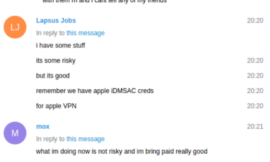
Published on: June 1, 2022 
A former US Marine has pleaded guilty to cyberstalking multiple young women in California in a sexual extortion campaign.
According to court documents, California resident Johao Miguel Chavarri (also known as Michael Frito) allegedly stalked and sent anonymous threatening communications to numerous victims from 2019 to 2021.
Going by the alias ‘Frito,’ the 25-year-old contacted victims on Instagram, Snapchat, and Twitter to compliment their appearance and photos. After getting their attention, Chavarri would offer the victims money to send him photos or videos.
“Some of the victims initially agreed to Chavarri’s requests and sent him nude, sexually explicit, or compromising photos,” read a press release issued last week by the US Department of Justice (DOJ).
“When victims either refused Chavarri’s initial request for photos, refused to send him additional photos or videos, or otherwise refused to continue to communicate with him online, Chavarri began to harass, threaten, and extort the victims using numerous online accounts,” the DOJ added.
Chavarri would then threaten to publish sexually explicit photos and videos of the victims online or on pornography websites before sending them to victims’ boyfriends, friends, family members, or employers.
“Chavarri threatened his victims and their friends and family that he would ruin their lives,” said the DOJ.
The ex-Marine pleaded guilty to three counts of cyberstalking and is scheduled for sentencing on Sept. 15. If found guilty, Chavarri will face up to five years in prison on each count. A federal district court judge will determine any sentence after considering the U.S. Sentencing Guidelines and other statutory factors.
The FBI’s Los Angeles Field Office, Long Beach Resident Agency, investigated the case, with assistance from the Naval Criminal Investigative Service.
Source of Article



